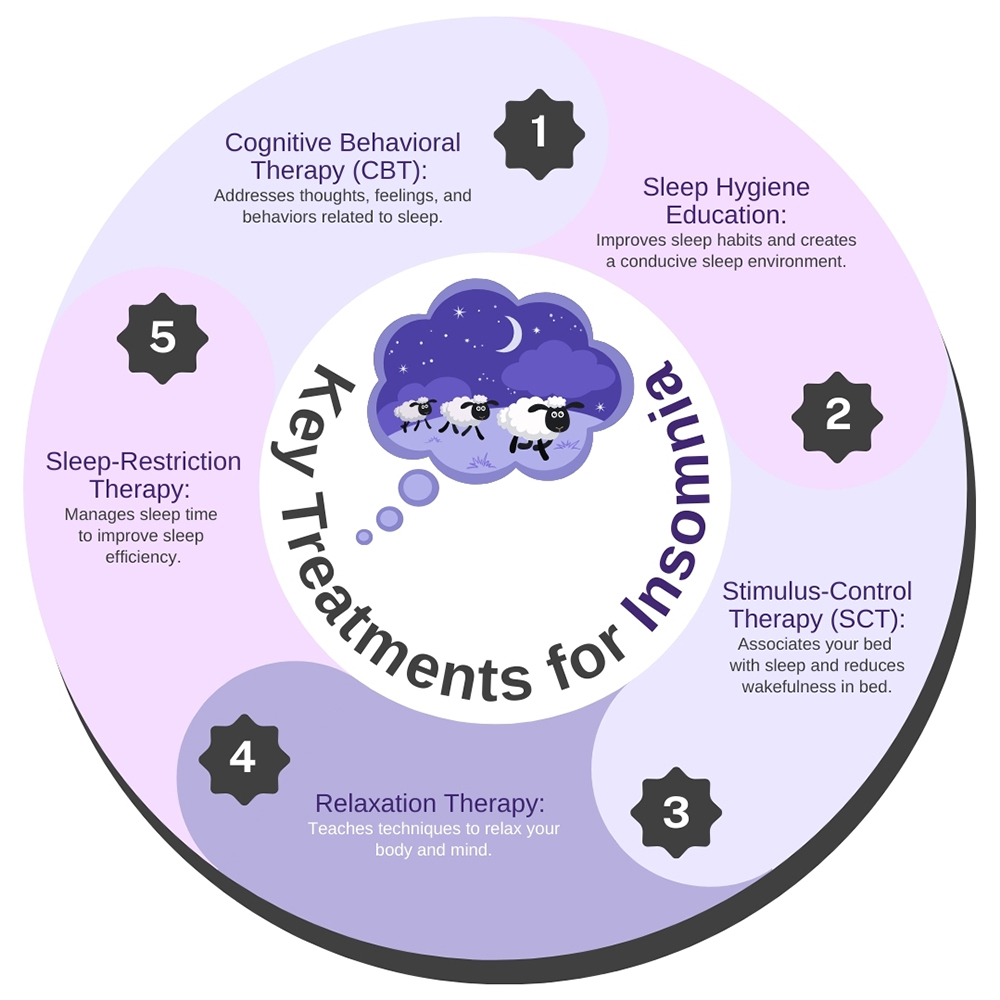Understanding Insomnia

What Is Insomnia and What Are the Common Symptoms?
Insomnia is a sleep-wake disorder in which people are dissatisfied with their sleep quality or quantity. This means that it may be difficult to fall asleep or stay asleep. Sleep difficulties are prevalent, “with about 33% to 50% of adults reporting regular difficulty” with sleep, according to Pubmed. Insomnia causes significant distress or social, occupational, educational, academic, behavioral, or other important areas of functioning impairment.
The Impact of Insomnia
Many don’t fully acknowledge the importance of sleep on our physical and mental health. Quality sleep isn’t just about feeling refreshed – it’s essential for your overall health and well-being.
The impact of insomnia on health includes:
- Weakened immune system
- Anxiety
- Depression
- Irritability
- Memory issues
By improving your sleep and treating insomnia, you’re not only promoting rest but also improving your physical and mental health.
What Types of Healthcare Professionals Are Involved in Treating Insomnia?
Different types of healthcare professionals can help you treat your insomnia including:
- Primary care physicians (PCP): Your doctor can assess for insomnia and identify if a medical reason causes your sleep issues.
- Sleep medicine specialists: These doctors have additional training on sleep-wake disorders that can help treat insomnia with sleep studies and medication.
- Mental health professionals: A therapist can help you identify and treat the underlying causes of insomnia, such as trauma, depression, or anxiety, and teach you healthy sleep habits that can improve sleep.
The important thing to remember is that you can achieve restful sleep. The first step is to ask for help.

Insomnia Treatment Options
What Are the Main Treatment Options for Insomnia?
The main research-based treatment options for insomnia include:
- Cognitive Behavior Therapy (CBT): CBT uses behavioral techniques and “produces results equivalent to sleep medication, with no side effects, fewer episodes of relapse, and a tendency for sleep to continue to improve long past the end of treatment”.
- Sleep hygiene education: You and your therapist will work together to create a sleep schedule and habits that work for you.
- Stimulus-control therapy (SCT): Stimulus-control therapy is a type of CBT that operates with the belief that certain stimuli in your bedroom can be associated with wakefulness or sleepiness. Your therapist will provide you with SCT skills you can use to improve your sleep quality and quantity.
- Relaxation therapy: Relaxation therapy can help you learn techniques to relax your body’s muscles, leading to improved sleep.
- Sleep-restriction therapy: This is a form of CBT that helps you identify the right amount of time to spend in bed to decrease the amount of time awake in bed.
There are plenty of ways a therapist can help you improve your sleep and insomnia. Your therapist will use techniques most beneficial to you based on the severity of your insomnia and your lifestyle.
How Effective Are Medications in Treating Insomnia Symptoms?
Medications can help you get more sleep at night. However, it is important to remember that medications do not address the root causes of insomnia. At times, insomnia returns when the medication is discontinued.
Medication can be a beneficial starting point to help you get to a place where you can get some rest and begin to work on the underlying issues resulting in insomnia. For these reasons, medications should be used as a short-term solution.
How Long Does Insomnia Therapy Typically Take to See Results?
How long it takes for insomnia therapy to begin working depends on each client and their specific sleep issues. Your therapist can give you tools you can use in your first session.
Is It Possible to Fully Recover From Chronic Insomnia?
With treatment, it is possible to overcome chronic insomnia. If you are struggling with insomnia, it is important to speak with a professional who specializes and has experience with treating insomnia. Your therapist will provide you useful tools to help you sleep longer and better throughout the night.
How Can I Maintain Good Sleep Hygiene After Completing Insomnia Therapy?
If you are consistent with the strategies you learn in therapy you will permanently recover from insomnia. Throughout therapy, you will have the opportunity to try different tools and skills and choose which you prefer to help with your insomnia.
If you are struggling with insomnia, sleep therapy can help. Cognitive behavioral therapy for insomnia (CBT-I) is one of the most effective sleep therapies available. To learn more about how CBT-I can help you overcome your insomnia, contact us today for a consultation.
How Insomnia Therapy Works
Initial Assessment
During your initial assessment, you and your therapist will work together to understand your sleep issues and history, including your symptoms, and sleep patterns. Your therapist will provide you with psychoeducation on healthy sleep habits and together, you will create a treatment plan.
Treatment Sessions
Throughout your treatment sessions, you and your therapist will discuss specific tools you can use to improve your sleep-wake cycle and well-being.
Progress Tracking
During therapy, you and your counselor will check in on your progress. Your therapist will have many tools to provide you and you can track your progress to adjust your treatment plan as needed for optimal results.
If you are struggling with insomnia, the Trauma Therapy Center can help. Cognitive behavioral therapy for insomnia (CBT-I) is one of the most effective sleep therapies available. To learn more about how CBT-I can help you overcome your insomnia, contact us today for an appointment to improve your sleep quality. We offer insomnia counseling online and in person in West Palm Beach, Palm Beach Gardens, and other parts of Palm Beach County.

